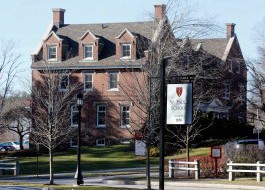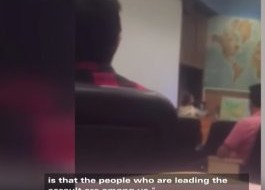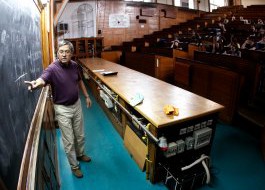
Oberlin College has dismissed Joy Karega, an assistant professor of rhetoric and composition, following an investigation into anti-Semitic and anti-Israel statements she made on social media -- including her assertion that ISIS is really an arm of Israeli and U.S. intelligence agencies and that Israel was behind the Charlie Hebdo massacre in Paris.
The college initially affirmed Karega’s right to academic freedom when her inflammatory statements surfaced earlier this year, but placed her on leave in August, pending an investigation into her conduct. Beyond concerns about anti-Semitism, which fit into larger complaints about escalating anti-Jewish rhetoric on campus, Karega’s case has raised questions about whether academic freedom covers statements that have no basis in fact.
Oberlin’s Board of Trustees ultimately voted to dismiss Karega for “failing to meet the academic standards that Oberlin requires of its faculty and failing to demonstrate intellectual honesty,” the college said in a statement released late Tuesday.
The vote followed “extensive consideration and a comprehensive review of recommendations from multiple faculty committees,” and from President Marvin Krislov.
Karega’s dismissal is effective immediately. Karega said via email on Wednesday morning that she intends to "challenge the college's decision and assault on my substantive rights through all the avenues I have available to me." She said that her Facebook posts were taken out of their original contexts and "grossly misrepresented" for political purposes.
 Joy Karega Facebook
Joy Karega Facebook
"Since the publication of the posts, I have been inundated with hundreds of hat email filled with slurs (racial, misogynist, classist), harassment and threats," she said. "To add insult to injury, for the last eight months, Oberlin has campaigned to implicate my professional fitness using arbitrary, inequitable and discriminatory practices. Indeed, the college launched an assault on my substantive rights."
Oberlin’s board said that the college’s commitment to academic freedom stands, and that the case against Karega came down to “professional integrity and fitness.” The college said Karega had received “numerous procedural protections” during her review, including representation by counsel; the ability to defend herself with witness testimony, documents and statements; and the opportunity to cross-examine those testifying against her.
“The faculty review process examined whether Karega had violated the fundamental responsibilities of Oberlin faculty members -- namely, adherence to the Statement of Professional Ethics of the American Association of University Professors, which requires faculty members to ‘accept the obligation to exercise critical self-discipline and judgment in using, extending and transmitting knowledge’ and to ‘practice intellectual honesty,’” reads Oberlin’s statement.
Contrary to this obligation, the college said, Karega “attacked her colleagues when they challenged inconsistencies in her description of the connection between her postings and her scholarship. She disclaimed all responsibility for her misconduct. And she continues to blame Oberlin and its faculty committees for undertaking a shared governance review process.”
Oberlin said the majority of the General Faculty Council, the faculty executive committee, concluded Karega’s Facebook posts “could not be justified as part of her scholarship and had ‘irreparably impaired [her] ability to perform her duties as a scholar, a teacher and a member of the community.’”
 Wikimedia Commons
Wikimedia Commons
Due to Karega’s “repeated refusal to acknowledge and remedy her misconduct, her continued presence undermines the mission and values of Oberlin’s academic community,” the college said. So “any sanction short of dismissal is insufficient and the [board] is compelled to take this most serious action.”
John K. Wilson, an independent scholar of academic freedom and co-editor of AAUP’s “Academe” blog, said he was troubled by numerous aspects of Oberlin’s statement. Worst is what appears to be the college’s primary justification for firing Karega, he said -- that she “attacked her colleagues,” allegedly in violation AAUP’s policy statement on professional ethics.
“This seems like a gross misinterpretation of AAUP documents,” Wilson said, adding that the document is “an ideal for faculty, not a disciplinary rule for which anyone can fired if they are deemed to make a lapse in self-discipline.”
“Faculty should be free to criticize their colleagues, especially when they are being attacked,” Wilson said. “If Karega’s offensive social media comments did not justify her dismissal -- as Oberlin's statement implicitly admits -- her defense of her offensive comments cannot become the legitimate basis for a firing.”
At various points in 2014 and 2015, after she came to Oberlin, Karega wrote on her Facebook page that ISIS was really U.S. and Israeli intelligence personnel, and that they -- not terrorists -- had planned the attacks on the Paris offices of the magazine Charlie Hebdo. She said Israel had downed Malaysian Airlines flight No. 17 over Ukraine, and she voiced support for Nation of Islam leader Louis Farrakhan’s declaration that Zionists and Israeli Jews were behind the Sept. 11 attacks.
Karega also shared anti-Semitic images, such as a picture of the Jewish banking heir Jacob Rothschild with the words “We own your news, the media, your oil and your government.”
Some of Karega’s posts are several years old but they came to light last winter, amid other concerns about anti-Semitic attitudes at Oberlin. Karega's posts differ from more common anti-Israel sentiments expressed on college campuses, however, in that they link Israel to events in which there is a broad consensus that it played no role.
Oberlin initially backed Karega’s right to free speech while distancing itself from her comments, saying that it “respects the rights of its faculty, students, staff and alumni to express their personal views. Acknowledgment of this right does not signal institutional support for, or endorsement of, any specific position.” Krislov, the president, doubled down on the college’s position a few days later, saying that as a Jew, he was deeply hurt by statements like those Karega had made. But as an academic, he said, he believed deeply in free expression.
Yet Oberlin’s board soon announced that it had asked the college to look into Karega’s professional fitness. “These postings are anti-Semitic and abhorrent,” Clyde S. McGregor, chair of Oberlin’s Board of Trustees, said in a March statement. “We deplore anti-Semitism and all other forms of bigotry. They have no place at Oberlin. These grave issues must be considered expeditiously.”
The majority of Oberlin’s faculty signed a statement in April condemning Karega’s statements as anti-Semitic. “Bigotry has no place on the Oberlin campus (or anywhere),” it says. “It sullies the values of equality and mutual support that are embedded in our institutional DNA as the first coeducational college and the first to admit students of all races as a matter of policy.”
Some of those professors who didn’t sign the statement spoke out, however, saying that feared Karega was being scapegoated for bigger problems with racism and anti-Semitism on campus.
Karega, who has enjoyed some public support from Oberlin students, said that her "heart goes out to Oberlin students who, throughout this controversy, have done what the governing bodies, administration and some faculty have failed to do. Oberlin's student body has approached this controversy employing fairness, respect for me as a faculty member, and a desire for critical inquiry and productive engagement. The Oberlin community doesn’t deserve this racist, arbitrary attack which has damaged the name and reputation of 'Oberlin.'"
Read the original article on Inside Higher Ed. Copyright 2016. Follow Inside Higher Ed on Twitter.




